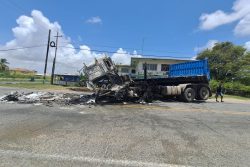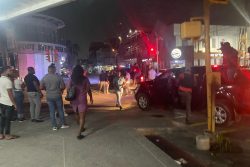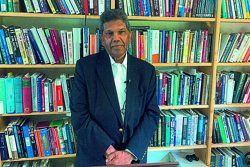Dear Editor,
Much has been said recently about the President’s visit to the United Kingdom but not much was revealed about the outcome of what in effect appears to be a junket.
We know about the courtesy call on Her Majesty, the Queen, the meeting with Czarnikow, a talk with a spattering of potential investors and a chat with a group of Guyanese nationals at the High Commission.
For reasons known only to a selected few on the British and Guyanese sides, the President did not meet with his UK counterpart, Theresa May.
Clearly, the visit took place at a bad time when a number of key British officials were not available due to campaigning for local government elections and general elections due to be held in June this year in the UK.
The Guyana High Commission in London should have offered its advice to the Foreign Ministry in respect to the bad timing of the visit in light of the unavailability of key government officials.
On the delegation’s return to Guyana, Foreign Minister Greenidge, divulged scanty information about the UK government’s position on its future trade relations with CARICOM countries in the wake of Brexit. This was to be expected in view of the uncertainties.
Traditionally, on returning to Guyana from an overseas state, official or working visit by a sitting Guyanese Head of State, a press conference would be held to brief the media about the results of the visit and to answer questions posed by journalists present.
This was not done in respect to the visits to The Bahamas nor the UK. Eyebrows are continuously being raised at various levels of society as regards this unusual practice.
Contrary to established practice earlier mentioned, about a week later, the Guyanese Foreign Minister broke the eerie silence about President’s official visit to the UK.
Interestingly, the Minister spent a peculiarly lengthy period of time dilating on security sector reform conveying the impression that ‘deliverance’ was around the corner.
Having ‘bad talked’ and, on assumption to office, jettisoned the security sector reforms initiated by the PPP/C administration, the ‘know-it-all’ security experts ensconced at the Ministry of the Presidency opted to approach the British Government to provide an alternative plan. But the big problem has to do with financing the plan. What is clear is that the Government of Guyana will not receive the £4.9m previously offered by the Brits to fund the plan rejected by the PPP/C.
On the contrary, a substantial portion of the counterpart funds will have to be sourced from the national coffers. And a suggestion has been made to the effect that the private sector should top up the resources required to finance the plan. But the plan is yet to see the light of day. And the consultant embedded at the Ministry of the Presidency, after being given an extension of the deadline for completion of his Interim Report is still scrounging around for information and data to fill critical gaps in the body of the report.
From all indications, whatever the shape or form of the plan, we are looking at 2018 as a possible time frame for the public to learn about the contents of the plan and how its implementation will be financed.
And if security sector reform a la Granger administration is merely about strengthening the Strategic Planning Unit of the GPF, methods for promotion, salary scales, public relations and catching rogue cops, then not only is the plan severely limited, it doesn’t differ much from what Capita Symonds had recommended long before. Thus from all appearances, the final product is likely to be much ado about nothing!
Concerns have been raised in some quarters over the biased approach adopted by the consultant, Russel Combe during his social and official meanderings not to mention his total deprecation of the political sensitivities concerning the current environment in which the plan is being hatched.
Experience has shown that few consultants treating with security sector reform while gathering information and data for inclusion in their Inception Report make no serious efforts to become au fait with the relevant sections of the Constitution of Guyana, the Police Act and the Police Discipline Act as well as the Standing Orders of the Guyana Police Force and to contextualise their narrative and recommendations in the framework of those important documents.
Moreover, it is not unusual for such consultants to insert in their Inception Reports their own preconceived ideas, notions and even recommendations imported from the UK or taken from other Inception Reports on police reforms in other jurisdictions.
The consultant must ensure that professionalism, independence and impartiality are maintained in seeking out information and data for inclusion in his Inception Report.
The extant political environment where the security forces at SOCU and Force Headquarters are implicitly bowing to political pressure to go after opposition politicians and other functionaries perceived to be supportive of the PPP must not in any shape, form or fashion influence the consultant less both he and his report be condemned as politically tainted and motivated.
Yours faithfully,
Clement J. Rohee









